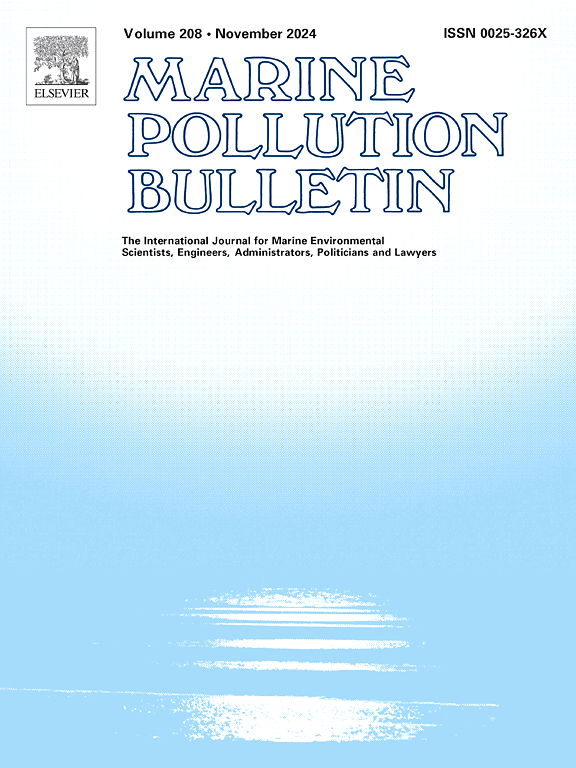沿海脱氧对细菌群落中抗生素耐药基因谱的影响
IF 5.3
3区 环境科学与生态学
Q1 ENVIRONMENTAL SCIENCES
引用次数: 0
摘要
氧气损失破坏海洋生态系统,威胁生物多样性并造成海洋生物大量死亡。抗生素耐药基因(ARGs)通过促进耐药病原体的传播、使感染更难治疗和增加死亡风险,对人类健康构成重大威胁。然而,脱氧和ARG动力学之间的相互作用仍然知之甚少。在这项研究中,我们采用时间序列宏基因组学研究了东海22天夏季脱氧事件中自由生活(FL)和颗粒相关(PA)部分ARG谱对氧损失的响应。共鉴定出1186个ARG亚型和2279个移动遗传元件(MGE)亚型。耐药类别以多药为主(23.5%),其次为四环素(15%)、大环内酯-lincosamide-streptogramin(13.4%)、多肽(10.3%)、糖肽(8.7%)、氨基糖苷(7.3%)和β -内酰胺(4.9%)。我们发现FL部位ARG丰富度随着氧水平的降低而增加,特别是β -内酰胺类和多药类,而PA部位没有观察到显著的关系。虽然两个部位ARGs的总相对丰度没有明显的氧依赖性,但FL部位的β -内酰胺和多药耐药基因随着氧的损失而显著增加。共现网络分析显示,FL馏分中ARGs和MGEs之间存在较强的正相关,表明基因在环境细菌之间的转移增强。此外,中性群落模型分析表明,随机过程在形成两种细菌组分中ARG组成动态方面也发挥了交互作用。我们的研究结果提供了证据,表明沿海脱氧通过mge介导的转移优先富集FL细菌中的高风险ARGs(例如β -内酰胺酶基因),突出了气候变暖下威胁生态系统和人类健康的抗生素耐药性风险不断升级。本研究为沿海生态系统中ARG的大小分级监测和有针对性的缓解策略提供了一个框架。本文章由计算机程序翻译,如有差异,请以英文原文为准。

Impact of coastal deoxygenation on antibiotic resistance gene profiles in size-fractionated bacterial communities
Oxygen loss disrupts marine ecosystems, threatening biodiversity and causing mass mortality of marine life. Antibiotic resistance genes (ARGs) pose a significant threat to human health by promoting the spread of resistant pathogens, making infections harder to treat and increasing mortality risks. However, the interplay between deoxygenation and ARG dynamics remains poorly understood. In this study, we employed time-series metagenomics to investigate the responses of ARG profiles in free-living (FL) and particle-associated (PA) fraction to oxygen loss during a 22-day summer deoxygenation event in the East China Sea. In total, we identified 1,186 ARG subtypes and 2,279 mobile genetic element (MGE) subtypes. The most dominant resistance classes of antibiotics were multidrug (23.5%), followed by tetracycline (15%), macrolide-lincosamide-streptogramin (13.4%), peptide (10.3%), glycopeptide (8.7%), aminoglycoside (7.3%), and beta-lactam (4.9%). We found that ARG richness in FL fraction increased with declining oxygen levels, particularly for beta-lactam and multidrug class, while no significant relationship was observed in the PA fraction. Although the total relative abundance of ARGs in both fraction showed no significant oxygen dependence, beta-lactam and multidrug resistance genes in FL fraction significantly increased with oxygen loss. Co-occurrence network analysis revealed stronger positive associations between ARGs and MGEs in the FL fraction, suggesting enhanced gene transfer among environmental bacteria. Furthermore, neutral community model analysis indicated that stochastic processes also played an interactive role in shaping ARG composition dynamics in both bacterial fractions. Our findings provide evidence that coastal deoxygenation preferentially enriches high-risk ARGs (e.g., beta-lactamase genes) in FL bacteria through MGE-mediated transfer, highlighting escalating antibiotic resistance risks that threaten both ecosystem and human health under climate warming. This study offers a framework for size-fractionated ARG monitoring and targeted mitigation strategies in coastal ecosystems.
求助全文
通过发布文献求助,成功后即可免费获取论文全文。
去求助
来源期刊

Marine pollution bulletin
环境科学-海洋与淡水生物学
CiteScore
10.20
自引率
15.50%
发文量
1077
审稿时长
68 days
期刊介绍:
Marine Pollution Bulletin is concerned with the rational use of maritime and marine resources in estuaries, the seas and oceans, as well as with documenting marine pollution and introducing new forms of measurement and analysis. A wide range of topics are discussed as news, comment, reviews and research reports, not only on effluent disposal and pollution control, but also on the management, economic aspects and protection of the marine environment in general.
 求助内容:
求助内容: 应助结果提醒方式:
应助结果提醒方式:


